Calls for comprehensive approach following UNSC Sudan resolution

The UN Security Council in session (File photo: UN)
The paramilitary Rapid Support Forces (RSF) have welcomed the United Nations Security Council’s adoption of Resolution No 2724 on Friday, urging an immediate halt to hostilities in Sudan. The Sudanese government, represented by Lt Gen Yasir El Atta, member of the Sovereignty Council and deputy commander-in-chief of the Sudan Armed Forces (SAF), has set conditions for acceptance.
El Atta declared their rejection of any truce during Ramadan or beyond at a tactical meeting in Kassala, eastern Sudan, attended by Finance Minister Jibril Ibrahim.
In an exclusive interview with Radio Dabanga, former diplomat El Sadig El Magali highlighted the significance of the Security Council’s decision. He emphasised that Resolution 2724 was adopted with international consensus, reflecting a collective acknowledgment of the urgent need to address the crisis in Sudan.
El Magali noted that while the resolution lacked a binding legal framework under Chapter VII, it carried moral weight.
He stressed the humanitarian imperative to prevent further devastation in Sudan, where the situation is rapidly deteriorating, risking widespread famine and infrastructure collapse.
Furthermore, the former diplomat questioned the choice of reference in the resolution, suggesting that international humanitarian law should have been the primary framework.
He underscored the need for a comprehensive approach, considering the Geneva Conventions and Additional Protocols I and II, which specifically address conflicts and war-related issues.
In addition to Resolution 2724, the Security Council issued Resolution 2725, renewing the mandate of the Panel of Experts on Sudan, with a focus on Darfur.
This decision underscores the gravity of the situation in Darfur, where over three million people are displaced, and the conflict continues to escalate.
The international community views these resolutions as a critical opportunity for all parties to end the suffering in Sudan and return to the negotiating table. Failure to comply could lead to further international action, signalling a deepening concern over the ongoing crisis.








 and then
and then